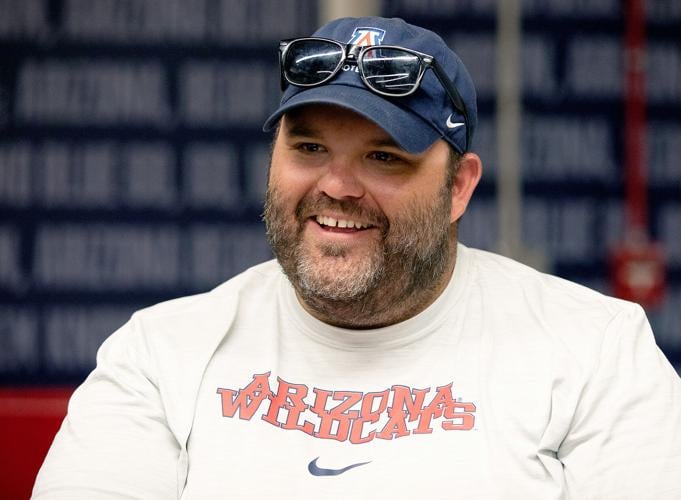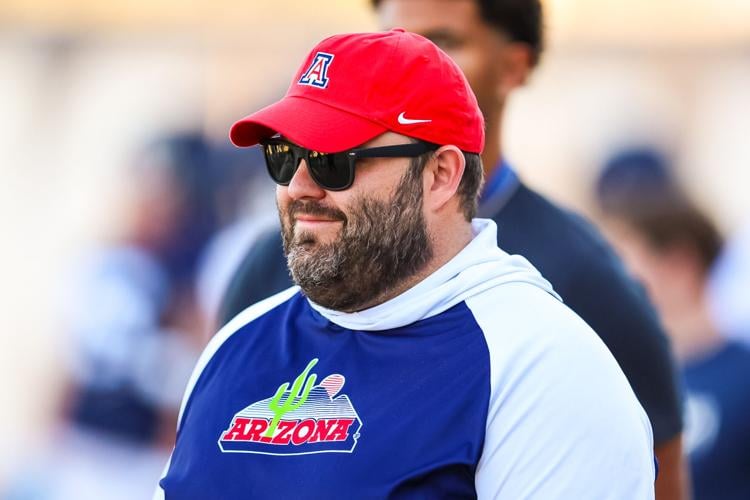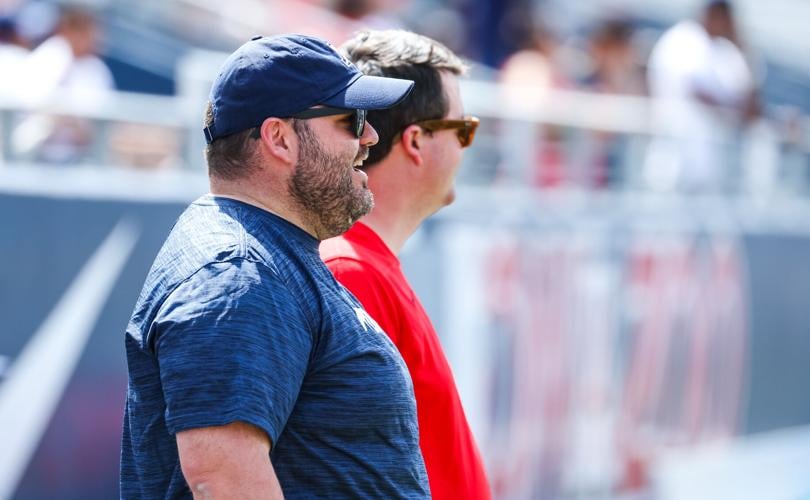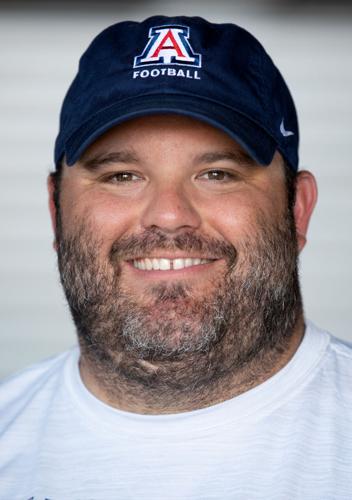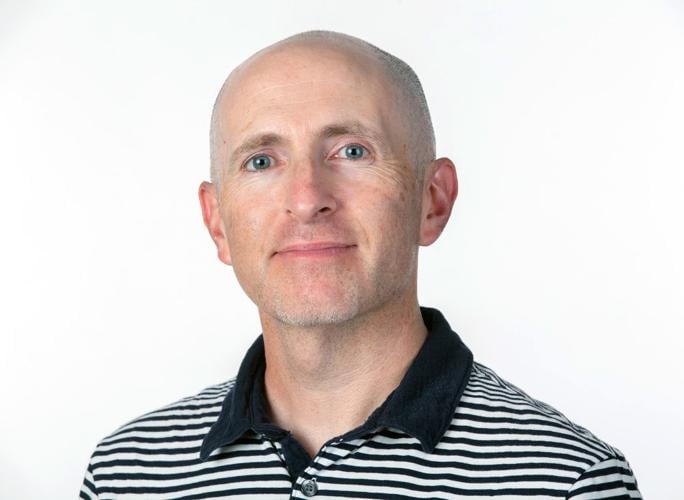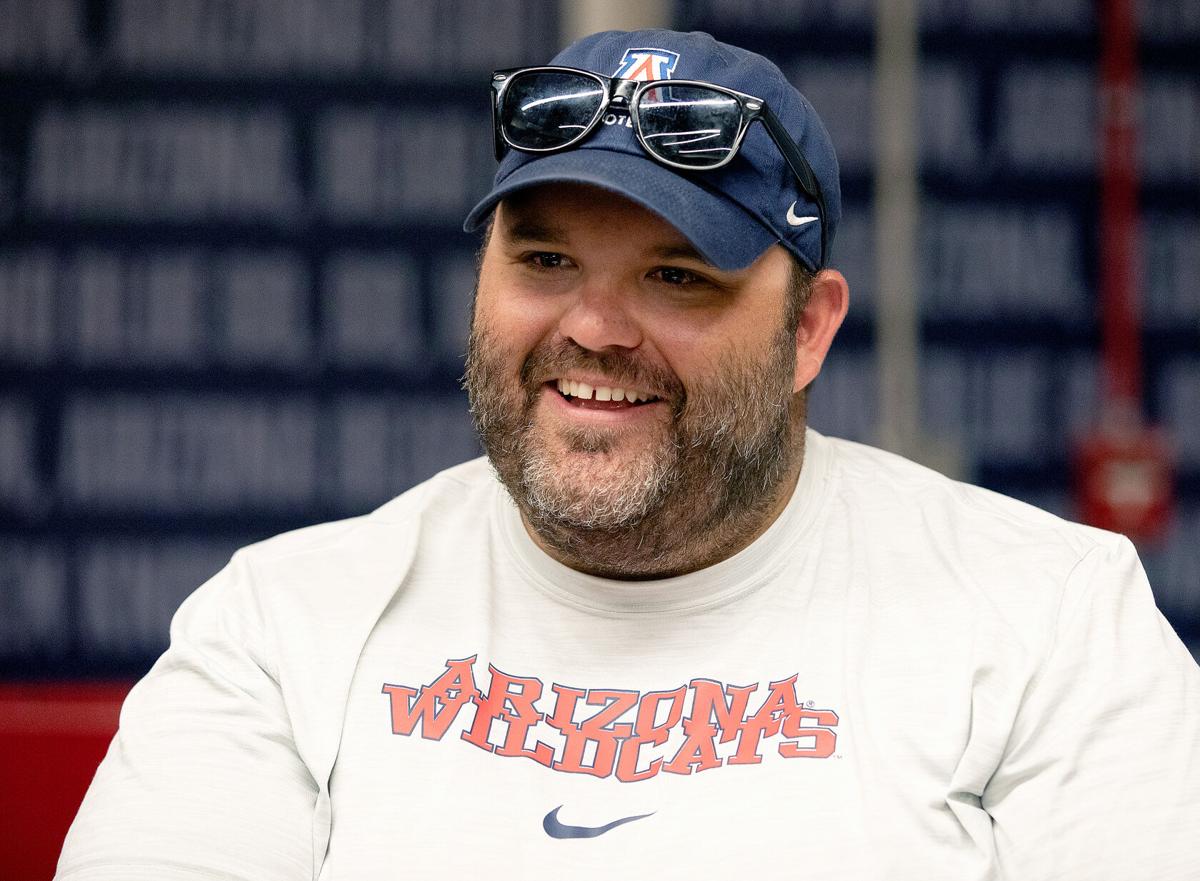Gaizka Crowley, the first-year general manager of the Arizona football program, was born in Eibar in the Basque Country of Spain. Crowley’s father, Francisco “Paco” Ansola, was a professional jai alai player back in the day who’d split his time between Spain and Miami.
Paco and his wife, Patty — whom he met at a fronton, where she took tickets for the jai alai matches — named their second son after a family friend. “Gaizka” means savior in Basque.
It’d be hyperbolic to dub Gaizka Crowley, 37, the Wildcats’ savior. But you could make a case that he’s the football team’s MVP behind the scenes.

Michael Lev is a senior writer/columnist for the Arizona Daily Star, Tucson.com and The Wildcaster.
The general manager has become one of the most important figures for college football programs as they grapple with the transfer portal, NIL and, as soon as next year, revenue-sharing and scholarship distribution. Just this week, Alabama gave GM Courtney Morgan a three-year contract with an average annual salary of $825,000. He reportedly turned down a similar post at USC that would have paid in excess of $1 million a year.
Brent Brennan was impressed with the work Crowley did at UNLV, where he helped accumulate the talent that enabled the Rebels to go 6-2 in the Mountain West Conference last year — tying Boise State and San Jose State (coached by Brennan) for the best record in the league. Crowley spent last season at Western Michigan.
“When I talked to the people he worked with at both places, they were just blown away by how good they thought he was and how much value he added to those programs,” Brennan said in spring. “We interviewed a handful of guys, and the conversation that we had with him was outstanding. He knocked it out of the park.
“He was all over it. It was really impressive. He’s been great so far.”
When he joined the UA program in February, Crowley stepped into a precarious situation. Brennan was trying to keep the roster intact after Jedd Fisch left for Washington. Arizona needed to add playmakers and depth to keep its momentum going after a breakthrough season. The programs that rode the coaching carousel in mid-January had fewer players to choose from in the portal than when it first opened in early December.

Arizona football general manager Gaizka Crowley watches the Wildcats pour onto the field for the second half of their evening practice session at Arizona Stadium on Aug. 13, 2024.
It was a challenging period, to be sure. It put Crowley’s scouting acumen to the test. But it was nothing he hadn’t seen or done before.
Getting started
Crowley grew up in Tallahassee, Florida, and played center for the Lincoln High School football team. His coach was Wade Rollinson, who also was the co-founder of a company called High Tech Video, which compiled recruiting clips for colleges.
“He would drive around in the summer and the spring, and he would dub VHS tapes and DVDs,” Crowley said. “He would sell them to colleges. He was Hudl before Hudl.”
Crowley — who retains the look of a center with his stocky build and round, bearded face — graduated from Florida State and returned to Lincoln High to coach and teach. Rollinson knew that Crowley wanted to be involved in college football, so he offered him an opportunity with his fledgling video operation.
“I can’t pay anything,” Crowley recalled Rollinson telling him. “But I might be able to introduce you to some people.”
Crowley assisted Rollinson while continuing to coach and teach. High Tech Video was bought by XOS Digital, which became a prominent provider of recruiting information and analytical software for college programs. Eight years ago, Catapult bought XOS for $60 million.
Crowley became XOS’ Midwest director of scouting. He moved to Chicago and covered a territory that stretched from Wisconsin to Ohio. His job was to find players, write evaluations and reports and deliver them to college programs’ recruiting staffs.
Not only did Crowley’s network grow, but so did his knowledge.
“I didn’t work for a college team,” he said. “So the colleges were more open to answering my questions because I wasn’t a competitor to them.”
One of Crowley’s contacts was Kelvin Bell, who’s now the defensive line coach at Iowa. Crowley had sent Bell some players, and Bell was about to return the favor.

Arizona general manager Gaizka Crowley got his start in the scouting business for the company that eventually became XOS Digital.
Crowley was scouting at a 7-on-7 event in Detroit when Bell called to tell him about a personnel job that had opened up at Southern Illinois under third-year coach Nick Hill. Bell asked Crowley if he was interested.
“I said, ‘Absolutely. Tell him I’ll take the job,’” Crowley said. “I didn’t need to know anything. I didn’t need any other details.”
The work Crowley did at SIU, an FCS program, prepared him for the jobs he’d later take at FBS schools. But his responsibilities in Carbondale, Illinois, weren’t limited to personnel management.
“I was the only person off the field,” Crowley said. “So there was no DFO (director of football operations), there was no director of recruiting. We didn’t even have a secretary. So my job was anything that Coach Hill needed. That was team travel, that was recruiting, it was team dinners, it was cleaning up the locker room, making sure the plane was on time, scholarship management, roster building — it was everything. I couldn’t ask for a better spot for my development.”
Marcus Arroyo hired Crowley at UNLV two years later — during the COVID summer of 2020. That period presented a plethora of personal and professional challenges for college football staffs. Crowley quarantined in a Las Vegas hotel room for three weeks while his family — he and wife Laura have one daughter, Eloise, and a son, Murphy — remained in Illinois.
The Rebels went 0-6 in ’20, Arroyo’s first season; 2-10 the next year; and 5-7 in 2022. Despite that steady improvement, Arroyo was fired. Crowley took the GM job at Western Michigan, where he worked for just over a year before Brennan beckoned.
‘What do we need?’
Brennan was on the job for about two weeks when he hired Crowley. Players were still coming and going. The Wildcats — who open the 2024 season on Saturday, Aug. 31, vs. New Mexico — had holes to fill.
What was atop Crowley’s to-do list at that time?

Arizona football general manager Gaizka Crowley, left, watches a spring football practice with chief of staff Ben Thienes at Arizona Stadium on March 30, 2024.
“The first thing is getting to know the roster,” he said. “The second step to that was IDing transfer-portal prospects, high school prospects. And then figuring out, ‘OK, what do we have? What do we need? And how do we find those players?’
“So that was a busy month. A lot of film time. A lot of getting to know our coaches here and finding out what they were looking for and what kind of players they want.”
The importance of the latter cannot be overstated. Anyone can look up heights, weights and testing times. Brennan and his staff weren’t just looking for the players who could run the fastest or jump the highest.
“There are plenty of really good players out there,” Crowley said. “The hard part is finding which ones. That is the difficulty.
“You have a pool of 10 players. How do you know which one is the best fit for us?”
Crowley rattled off multiple traits and variables that the UA staff considers: character, family, development, upside, injury history, experience, football IQ.

Gaizka Crowley is in his first year as Arizona football’s general manager — a critical front-office role in modern college football.
“It starts with ‘Coach B’ and his program philosophies,” Crowley continued. “You want to make sure, culturally, that we’re bringing in people that fit Coach’s vision for the program.
“The tape is the tape. But if those cultural things don’t check out, it’s a nonstarter for us.”
Crowley cited the example of offensive tackle Michael Wooten, who transferred to Arizona from Oregon. Wooten played sparingly for the Ducks over two seasons but was a sought-after three-star recruit from the Los Angeles area who had the physical tools, growth potential and makeup to develop into a starter.
“He didn’t play a ton there,” Crowley said. “But he was a model citizen — no issues off the field. It just wasn’t a fit for him for whatever reason. But you look (at him) and say, ‘Hey, I see the traits. I see the potential to develop into a really good player.’ ”
Wooten was one of about two dozen transfers who joined the UA program in the offseason — offsetting losses to Washington and other schools. Some will be starters. Others, such as Wooten, who got hurt during training camp, will provide depth.
A general manager’s work is never done. Along with director of scouting Fletcher Kelly and others, Crowley is working on future recruiting classes. He’s also Arizona’s NFL liaison, which gives him a chance to relay information to pro scouts — just like he did for college coaches at XOS.
There’s nothing Crowley would rather be doing. He’s an avid reader of football history; “Football Scouting Methods,” written by Bill Belichick’s father, Steve, is among Crowley’s favorite books. He also listens to scouting podcasts, including “Move the Sticks” hosted by NFL Network’s Daniel Jeremiah and Bucky Brooks.
Anything to help Crowley become the best evaluator he can be.
“You try to be a sponge, just like any other line of work,” he said. “You try to learn from coaches. I learn from our staff every single day.”
Arizona Wildcats star quarterback Noah Fifita spoke with local media following a training camp practice. (Video by Justin Spears / Arizona Daily Star)


